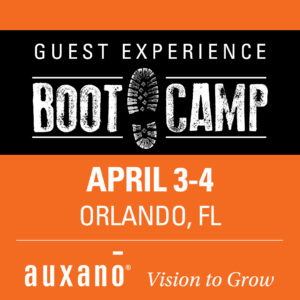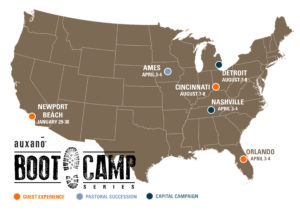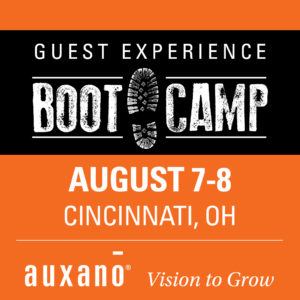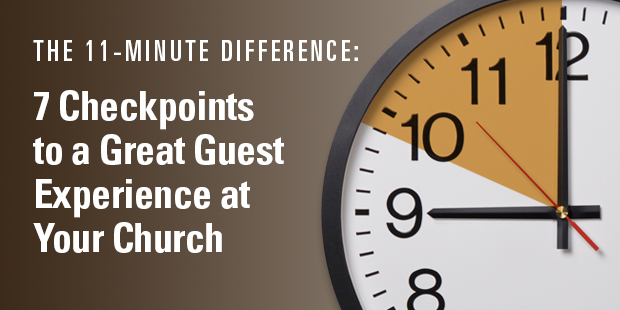– a note from the Vision Room Curator: During August we are focusing on Guest Experience in churches, but some of the most powerful learning for churches can occur by reading about customer service – all you have to do is substitute the word “Guest” every time you see “customer.” The following content was graciously supplied by Annette Franz, a customer experience expert. Enjoy!
Is your customer experience legendary?Do companies even know what it means to deliver “legendary customer service?”
I’ve been dealing with a provider for the last three and a half months that claims to deliver “legendary customer service.” They tout this on their website, in their emails, and even on their voicemails. The problem is, their service is not legendary – at least not in the (positive) way I’m sure they want it to be.
I’m meeting with this provider again this week, and in preparation, I thought I’d take a look at what it means to deliver legendary service. Perhaps I just don’t understand what they’re striving to deliver.
I’ll start with defining “legendary.”
Google defines legendary as:
- based on legends
- remarkable enough to be famous; very well known
Again, my guess is they want to be “very well known” for their levels of service, but known for it in a good way.
Since legendary is based on legends, I should understand that term, too. Wikipedia defines legend as:
…a narrative of human actions that are perceived both by teller and listeners to take place within human history and to possess certain qualities that give the tale verisimilitude. Legend, for its active and passive participants, includes no happenings that are outside the realm of “possibility” but which may include miracles. Legends may be transformed over time, in order to keep it fresh and vital, and realistic. Many legends operate within the realm of uncertainty, never being entirely believed by the participants, but also never being resolutely doubted.
Synonyms are “myth” and “fairy tale.”
I’m still waiting for the miracles. And that “never being entirely believed” part is what I’m wondering about. Perhaps their legendary service is just a fairy tale.
I went on a Google hunt to see how people/companies define “legendary customer service” or “legendary customer experience.” I found that not many brands tout this; I supposed it’s a pretty extreme thing to say or to claim. And those that did, well, they were really describing what I call “the basics.”
Perhaps claiming that you’ve got legendary service is a bit pointless.
Sam Walton said: The goal as a company is to have customer service that is not just the best but legendary. Do you feel like you get legendary customer service when you go to WalMart? Is it legendary in a good way or a bad way?
The companies that deliver that extraordinary level of service don’t have to tell customers in their voicemails and emails, quite honestly; they just do it! We know they do it. Think: Zappos, USAA, The Ritz-Carlton, Southwest, Nordstrom, et al.
Want to talk about customer experience legends? Google “Nordstrom returns tires.”
Some of the brands that mentioned legendary service defined it as making sure they met and exceeded the expectations of their customers. (Without a doubt, key to that is understanding what customers’ expectations are. Exceeding expectations cannot occur without understanding expectations first.) But is that legendary, or is that, too, “just the basics?” Saying you’re going to meet and exceed expectations is quite generic. As a customer, what does that mean to me? And how do you, as a company, know that you’ve exceeded my expectations.
At the very least, I would hope that all businesses strive to meet their customers’ expectations. Remember, Performance – Expectations = Satisfaction. Your performance must be greater than those expectations in order to be positively reflected in that equation!
So if you’re going to tout legendary service, well then, by George, you better have something special!
Legendary service means going the extra mile, but you can’t go the extra mile until you get the last mile right. Delivering on the last mile is all about giving your customers what they expected. The extra mile is that piece that really adds the component of delight.
What most organizations think is legendary is really (barely) the basics; they’re just striving to get to/through the last mile. The extra mile, or that legendary service, is a pipe dream for them.
Let’s look at the basics first; they include things like…
- Treating customers with respect
- Acting with integrity
- Being polite – definitely not rude!
- Trusting your customers – don’t call them liars!
- Being responsive – set an SLA for response time that shows you care! And stick to it!
- Doing what’s right for the customer – you and your organization know what that means; and if you don’t, ask your customers
- Doing right by the customer – again, you and your organization know what that means; if not, then ask
- Showing empathy and understanding for the customer’s situation
- Walk in the customer’s shoes; don’t make him walk in yours (e.g., “Oh, that’s easy for me; I can do that. Why can’t you?”
- Putting the customer’s best interests before your own
- Caring about your customers (we can tell when you don’t)
- Being willing to help your customers
- Adopting an attitude of “yes”
- Doing what you say you’ll do
- Understanding your customers – the person, the situation, their expectations, and more!
- Making it effortless for customers to do business with you
- Meeting my expectations
Honestly, this is just meeting today’s customer expectations.
And yet, the provider I’m meeting with fails on all of these. All of them.
If those are the basics, then figure out how you can go above and beyond. Every service situation differs. Know your customers. Figure it out. Find out how you can go above and beyond in a way that is meaningful and relevant to the customer in front of you.
It takes a lot to deliver a legendary level of service. Here’s what I think legendary customer service includes:
- All of the items/basics listed above, plus…
- Identifying/understanding my expectations – and exceeding them
- Doing the unexpected, and
- Adding elements of delight that I would appreciate (Need examples? Check out this book!)
- Being proactive – why should the customer wait for you? and wait, and wait, and…
- Personalizing it – make it for me and about me, no one else
- Being remarkable – at all you do, in every interaction
- Being consistent – from interaction to interaction, from employee to employee
What would you add to this list?
Just because you say you deliver legendary service doesn’t make it real. Just because you tell customers that’s what you deliver doesn’t make it real. As a matter of fact, once you say it, you better darn well deliver on it. And remember, actions speak louder than words.
Perhaps this particular provider that I’m dealing with does deliver on it for other customers, but I’d like to reiterate this: legendary service is not selective; legendary service is consistent. You need to uphold the same high standards for every interaction, by every employee. And if you have an employee that can’t deliver, perhaps he’s not a good fit and needs to go!
That’s a great segue into what this means for the inner workings of your organization. In a nutshell, there must be:
Is your company’s culture and customer experience the stuff that legends are made of?
I’ve learned that people will forget what you said, people will forget what you did, but people will never forget how you made them feel. -Maya Angelou
> Read more from Annette.

Want to learn how to create an EXCEPTIONAL Guest Experience at your church? Check out Auxano’s Guest Experience Boot Camp, coming to Orlando, FL on April 3-4.

Tags: Annette Franz, Basics, Church Guest Experience, Guest Expectations, Guest Experience
|
What is MyVisionRoom? > | Back to Execution >



































